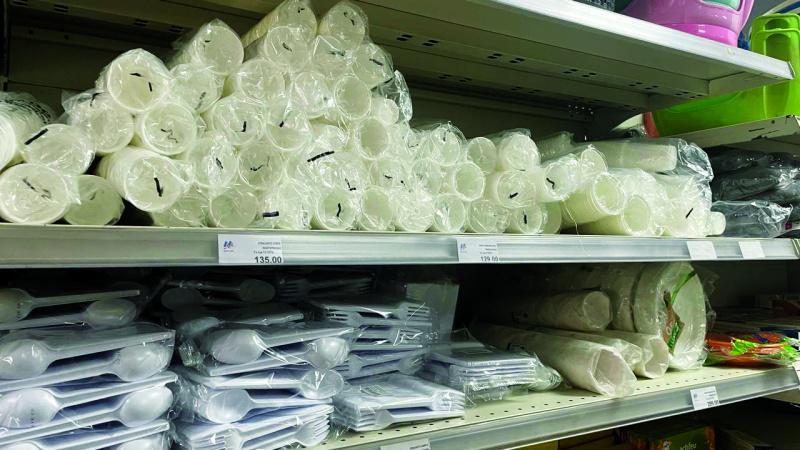Africa-Press – Cape verde. The entry into force of the Legal Regime for the Commercialization, Import, Distribution and Production of Single-Use Plastic, applicable to all economic sectors and all commercial agents, has generated confusion and uncertainty among citizens. With criticism of the lack of publicity of the decree-law, many find themselves without guidance on how to deal with products already available on store shelves.
The decree-law that establishes a ban on the entry and production of single-use plastic in the country came into force on March 21st, as announced in the Official Bulletin. This measure covers a range of single-use plastic products, such as cotton swabs, disposable plastic cutlery, disposable plastic plates, straws and balloon sticks.
The Government, in justifying this decision, points to the growing problem of pollution resulting from the increase in waste production, particularly plastic pollution, which affects several ecosystems, including the marine environment, biodiversity and public health. Furthermore, it recognizes that this pollution can cause damage to sectors such as tourism and fishing.
With the entry into force of the decree-law, the sale, import and distribution of a series of single-use plastic products, such as drink cups, cutlery, plates, bowls, meal trays, drink stirrers, cotton swabs, straws, packaging and food containers. However, there are exceptions for biodegradable products or products that contain at least 50% recycled material in their composition. Containers made of expanded polystyrene, such as capsules, lids, food boxes and balloon sticks, are also prohibited.
It is noteworthy that the new plastic law, approved the previous year, establishes a legal regime for the marketing, import, distribution and production of bags, packaging and other single-use plastic objects. This measure aims to contribute to the reduction of plastic pollution and promote more sustainable practices in the country.
Population
During a tour of the center of the city of Praia, we found that many citizens are unaware of the ban on the entry and production of single-use plastic in the country. Some users consider the measure to be somewhat exaggerated. “I’m not aware of the laws, but I think it’s something that the entire population uses and likes. They should look for alternatives so that the population can get used to it before the law comes into force”, says Jesuilma, a trader at the Platô market.
In the same vein, we approached Emerson, a young man carrying a black plastic bag, typical of Chinese stores. Emerson reveals that he knows a little about the plastic ordinance that recently came into effect, but admits that in practice he doesn’t fully understand how it works.
“I read about the recent ban on the use of plastic, but it is something that goes unnoticed in everyday life. I believe that if it were more publicized in communication, people would be better informed and would not commit so many infractions. For example, we have the plastic bag that does not meet the requirements of having at least 50% biodegradable plastic in its composition, but it is something that a layman does not understand and ends up ignoring completely”.
Commercial houses
In conversation with the commercial manager of one of the mini-markets in the country’s capital, she explains that she understands the concern and impact that this situation can have for many establishments. As the person responsible for a store, the interviewee, who preferred to speak anonymously, says that she understands that banning the sale of single-use plastic products is an important measure to protect the environment and combat plastic pollution. However, she stresses that it is understandable that this new legislation could cause difficulties for companies that already have plastic products in stock and are awaiting orders.
“As commercial manager, I can say that the store invested in plastic products based on existing demand and commercial practices in force until then. I had no prior knowledge of this change in legislation and, like many other traders, I am now faced with the challenge of dealing with existing stock and orders already placed. Despite the difficulties that this situation may cause in the short term, I believe it is important to prioritize compliance with the law and find a way to adapt to this new reality. I am willing to explore more sustainable alternatives and seek creative solutions to minimize the negative impact on store operations. I believe that the law should be better socialized and that it should come into force little by little.”
This manager argues that this transition will not be easy, but believes that if all traders have time to evacuate the product in stock, they will be readily committed to working within the new guidelines and collaborating with other companies and authorities to ensure a smooth and responsible transition. for everyone involved.
In turn, Patrícia Semedo, responsible for the Mundilar 5 de Julho store, states that the store was already aware of the entry into force of the decree-law that prohibits the sale and entry into the country of single-use plastic products. This person understands the environmental impacts caused by plastic pollution and ensures that the store, for which she is responsible, has already taken measures to adapt to customer demand and collaborate with the environment at the same time.
“Upon learning of the entry into force of the decree-law, we canceled orders for the aforementioned single-use plastic products and are transitioning to products that are biodegradable and comply with established guidelines. I believe that there will be no constraints in complying with the law. If the banned products do not enter the country, people will adapt to the new options. Preserving the environment and promoting more sustainable business practices are objectives that we should all support and prioritize, even if this requires sacrifices and short-term adjustments.”
Legal Analysis
The President of the Cape Verde Bar Association, Júlio Martins Júnior, clarifies that it was not with the Joint Ordinance of 5/2024 of 21 March that the prohibition of placing and making single-use plastic objects available on the market was established. In fact, this person explains that this prohibition already stems from Law 22/X/2023, of April 18th, and which came into force on October 15th, 2023.
“This Law established the Legal Regime for the Commercialization, Import, Distribution and Production of Single-Use Plastic, which applies to all sectors of economic and industrial activity and to all economic agents that carry out both wholesale and retail trade. , formal or informal, and to all stages of manufacturing, processing and distribution of single-use plastic materials and objects, with the exception of the areas of health, cosmetics and personal hygiene”.
The President highlighted that for reasons of legal security, the Joint Ordinance of 5/2024, of March 21st, established the list of single-use plastic materials considered prohibited.
“Although Law 22/X/2023, of April 18, came into force on October 15, 2023, the truth is that the prohibitions established therein have not yet come into force immediately, due to a transitional rule that determines that the rules relating to prohibitions contained in this Law come into force within a period of one year after its publication, that is, on April 19, 2024. Consequently, stores that currently have prohibited products will necessarily have to remove them from shelves, as the prohibition also covers their local marketing”.
Despite this prohibition arising from Law 22/X/2023, of 18 April, the President explains that it is still relevant that the list of prohibited products was published less than a month before the date of entry into force of those prohibitions. “Therefore, it is acceptable that traders may experience some difficulty in disposing of their stock in a short space of time. For this reason, we believe that the authorities will be sensitive in dealing with the issue, at least during a certain initial period, taking into account the principles of proportionality, adequacy, defense of commercial interests, as well as their legitimate expectations”.
“Ideally, the Government would have approved and published this list as an annex to Law 22/X/2023, of April 18, thus providing a clear and safe framework for traders to act, protecting their economic interests. Having failed to do so, this uncomfortable situation is now created and which requires common sense on everyone in the interpretation and application of the legal framework. In terms of supervision, the law assigns powers to a wide range of public entities to raise news reports in case of violation of marketing prohibitions, namely local authorities, within the areas of jurisdiction, as well as police authorities and IGAE ”.
The law provides for the application of sanctions in case of non-compliance, namely a fine of 10,000$00 (ten thousand escudos) to 300,000$00 (three hundred thousand escudos) or of 50,000$00 (fifty thousand escudos) to 1,500,000$00 (one million and five hundred thousand escudos), depending on whether the offending agent is, respectively, a natural or legal person, in addition to additional sanctions. This new legal framework arises within the scope of the Basel Convention on hazardous waste to which Cape Verde is a party. This Convention deals with the issue of waste management in its various aspects, to address the enormous environmental imbalance caused by the inadequate management of plastic waste.
expressodasilhas
For More News And Analysis About Cape verde Follow Africa-Press






